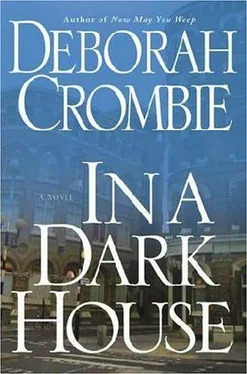“You didn’t leave anyone behind in the building?” asked Maura.
“No. But that’s the first thing I thought when I heard. What if one of my blokes forgot his lunch pail or something and went back, but I checked right off, and all my crew are accounted for. Crazy idea, anyway, as I’m the only one with a key.”
“And you locked the premises before you left?”
“’Course I did,” Spender said vehemently, but Maura thought she saw a bit of the color leach from his flushed face. “I always lock up, side door and then the front. Yesterday was no different.”
“Anyone else have access to your key?” asked the superintendent. When Spender gave him a startled glance, he introduced himself. “Scotland Yard. I’m Superintendent Kincaid.”
Spender glanced at his warrant card, shaking Kincaid’s hand a little more enthusiastically than he had Maura’s. “Not unless you count my wife and my two girls at home in Poplar. They’re eight and six, by the way, my girls.”
“What about the furniture?” Maura put in quickly, determined not to lose control of the interview. The man would be pulling out wallet photos of his kiddies if she wasn’t careful. “Where did it come from?”
Spender turned back to the building. “Cheap furnished flats, that’s how the place was being used when Mr. Yarwood bought it. Not much better than squats. He had a time getting the last of the tenants out, had to cut the power and water, but then we were able to get in.
“We started on the ground floor, pulling out walls to make the restaurant space. Then we moved all the furniture from the flats downstairs, ready for the rubbish skips. Should have come yesterday, the skips, but there was a delay with the delivery.”
“Restaurant space?” Kincaid asked, frowning.
“Luxury flats upstairs, restaurant downstairs. A celebrity chef, you know, like what’s his name, the cheeky chappy. But now…” Spender sighed, shrugged. “Who knows how long it will take to get this sorted, if at all.”
“Problem with the insurance?” Kincaid commented easily, as if it was to be expected, but Spender’s reply was wary.
“Not that I know of. It’s just these things take time. You know how it is.”
Kincaid gazed at the building, hands in the pockets of his Burberry. “Word has it the leases haven’t sold as fast as Mr. Yarwood had hoped.”
“It’s too soon to say that.” Spender’s voice held the first trace of irritation. “There’s no doubt they’d have sold, a place this close to the South Bank and London Bridge Station.”
“Let’s get back to the furniture, shall we?” said Maura, grinding her teeth. “How did you leave it yesterday?”
“Piled in the middle of the bloody room, wasn’t it? To give us as much working space as possible.”
“It didn’t occur to you it was a fire danger?”
“What else were we going to do with the stuff? Put it out in the street for a traffic hazard?”
“What about your crew? Any of them smoke?”
“Look, Inspector.” Spender took a breath and seemed to gain another inch or two in height. The friendly aura had vanished. “None of my lads left a fag end to smolder and set that furniture alight, if that’s what you’re thinking. They’ve more sense than that, and I’ve told you I checked the building over before I locked up. We left nothing out of place.”
“And you’re absolutely positive you locked both doors?” she asked.
“Of course I’m bloody sure. Do you take me for an idiot?”
Maura saw Sergeant Cullen glance at her and thought she read a trace of amusement. “Mr. Spender,” she began tightly, “we do need your cooperation here-”
“Mr. Spender, excuse me,” Kincaid broke in with his easy smile. “You may be able to account for your key, but surely there’s more than one?”
Following Winnie’s instructions, Gemma took the tube to Waterloo and walked south along Waterloo Road, passing the hulk of the railway terminal and the grimy brickwork of the lockups that abutted it. The rain had let up, but puddles stood on the pavement and the sky was still as solidly gray as gunmetal.
How odd, she mused as she picked up her stride, that she should find herself on the edge of Southwark, when Duncan had only that morning been summoned out to a case in the same borough. And odder still, the call from Winnie Montfort, who was not one to make spur-of-the-moment demands.
Fortunately, Gemma hadn’t anything too pressing for a Friday afternoon, and as her lunch usually consisted of a sandwich brought up from the canteen, she didn’t feel terribly guilty about taking a longer than usual lunch break. She had, in fact, been feeling rather restless and unsettled, and was glad for an excuse to stretch her legs and breathe in the cool, damp air flowing from the river.
She and Duncan had managed to see Winnie only once since Winnie had come up to London from her Somerset parish, and that had been on one of the weekends when Jack had joined her. Winnie and Jack had come to Notting Hill, duly admiring the house, and giving Gemma the opportunity to try out her very unpolished cooking and entertaining skills. Gemma had never had much time to cook and, until now, had certainly never lived anywhere with the space or the atmosphere conducive to giving dinner parties.
There had been times that evening, watching the group around her candlelit dining room table, when she’d felt like a child playing dress-up. But if she’d felt like an impostor in her own home, she had also, rather to her surprise, enjoyed herself. Not that she was in any danger of turning into Stella Fairchild-Priestly, the queen of hostesses, but perhaps her social life had begun to evolve past spag bol and a bottle of plonk.
Of course, she and Winnie had ended the evening with promises to get together soon, but then work had intervened on her part and she supposed the same had been true for Winnie. It was a shame, she thought now, as she was beginning to realize how desperately she missed having a close female friend now that Hazel Cavendish had gone.
Reaching The Cut, she turned left, passing the Old Vic Theatre on one side and a council estate on the other. Winnie had suggested they meet for a quick lunch at a pub called the Hope and Anchor, near her church and her temporary accommodation. Then, Winnie had promised, she’d explain why she’d rung.
The Cut, for all its unusual name, was an unremarkable street, lined with small grocer’s shops, cafés, dry cleaners, newsagents. Damp squares of betting slips littered the pavement outside a bookie’s premises, like giant confetti, and Gemma thought she smelled a faint tang of smoke beneath the traffic fumes.
Just as she spotted the pub’s name above an unassuming shop front, she saw Winnie standing outside, watching for her. If Winnie Montfort was not strictly beautiful, most people forgot it as soon as she smiled. Her pleasant face radiated honesty and humor, and she had the knack of making those she spoke to feel they had her undivided attention. Today, her soft brown hair curled about her face in the damp, and her clerical collar provided a slash of contrast beneath her cherry-colored raincoat.
Her face lit with pleasure at Gemma’s approach, and she gave her a quick hug. “Gemma, thanks for coming. They’re holding a table for us – I’ve just checked.”
“Busy place?” Gemma asked as she followed her inside.
“It’s gaining quite a reputation as a gastro pub,” Winnie told her, grinning. “Awful term, isn’t it? Always makes me think of some unmentionable complaint. But the food is good, and it’s more or less my local.”
The bar, with simple wooden tables and an upright piano in the corner, took up the right-hand side of the space, while partially drawn velvet drapes marked off the restaurant area to the left. A waiter seated them at a small table near the back of the restaurant and handed them laminated menu cards.
Читать дальше












